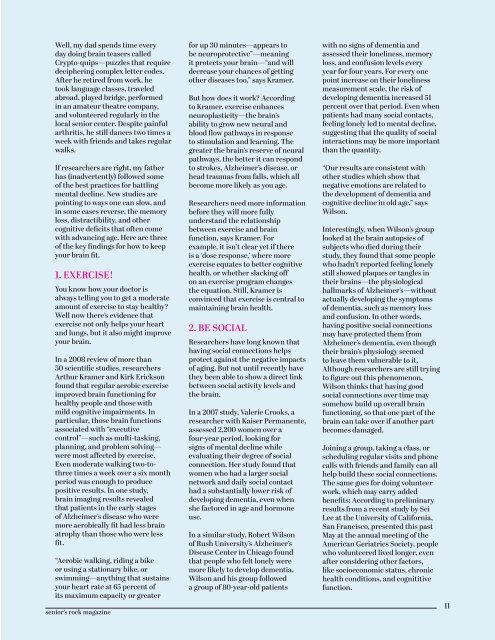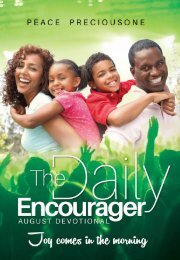SENIORS ROCK MAGAZINE1
Welcome to the maiden edition of SENIORS ROCK MAGAZINE, our new bi-monthly magazine designed especially for our Senior Citizens, their families and Caregivers. The creation of this new magazine is to create humor, laughter and love for readers who want to read, have some good laughter and feel hopeful for being part of the Senior Citizen Community.
Welcome to the maiden edition of SENIORS ROCK MAGAZINE, our new bi-monthly magazine designed especially for our Senior Citizens, their families and Caregivers. The creation of this new magazine is to create humor, laughter and love for readers who want to read, have some good laughter and feel hopeful for being part of the Senior Citizen Community.
Create successful ePaper yourself
Turn your PDF publications into a flip-book with our unique Google optimized e-Paper software.
Well, my dad spends time every<br />
day doing brain teasers called<br />
Crypto-quips—puzzles that require<br />
deciphering complex letter codes.<br />
After he retired from work, he<br />
took language classes, traveled<br />
abroad, played bridge, performed<br />
in an amateur theatre company,<br />
and volunteered regularly in the<br />
local senior center. Despite painful<br />
arthritis, he still dances two times a<br />
week with friends and takes regular<br />
walks.<br />
If researchers are right, my father<br />
has (inadvertently) followed some<br />
of the best practices for battling<br />
mental decline. New studies are<br />
pointing to ways one can slow, and<br />
in some cases reverse, the memory<br />
loss, distractibility, and other<br />
cognitive deficits that often come<br />
with advancing age. Here are three<br />
of the key findings for how to keep<br />
your brain fit.<br />
1. EXERCISE!<br />
You know how your doctor is<br />
always telling you to get a moderate<br />
amount of exercise to stay healthy?<br />
Well now there’s evidence that<br />
exercise not only helps your heart<br />
and lungs, but it also might improve<br />
your brain.<br />
In a 2008 review of more than<br />
50 scientific studies, researchers<br />
Arthur Kramer and Kirk Erickson<br />
found that regular aerobic exercise<br />
improved brain functioning for<br />
healthy people and those with<br />
mild cognitive impairments. In<br />
particular, those brain functions<br />
associated with “executive<br />
control”—such as multi-tasking,<br />
planning, and problem solving—<br />
were most affected by exercise.<br />
Even moderate walking two-tothree<br />
times a week over a six month<br />
period was enough to produce<br />
positive results. In one study,<br />
brain imaging results revealed<br />
that patients in the early stages<br />
of Alzheimer’s disease who were<br />
more aerobically fit had less brain<br />
atrophy than those who were less<br />
fit.<br />
“Aerobic walking, riding a bike<br />
or using a stationary bike, or<br />
swimming—anything that sustains<br />
your heart rate at 65 percent of<br />
its maximum capacity or greater<br />
senior’s rock magazine<br />
for up 30 minutes—appears to<br />
be neuroprotective”—meaning<br />
it protects your brain—“and will<br />
decrease your chances of getting<br />
other diseases too,” says Kramer.<br />
But how does it work? According<br />
to Kramer, exercise enhances<br />
neuroplasticity—the brain’s<br />
ability to grow new neural and<br />
blood flow pathways in response<br />
to stimulation and learning. The<br />
greater the brain’s reserve of neural<br />
pathways, the better it can respond<br />
to strokes, Alzheimer’s disease, or<br />
head traumas from falls, which all<br />
become more likely as you age.<br />
Researchers need more information<br />
before they will more fully<br />
understand the relationship<br />
between exercise and brain<br />
function, says Kramer. For<br />
example, it isn’t clear yet if there<br />
is a ‘dose response,’ where more<br />
exercise equates to better cognitive<br />
health, or whether slacking off<br />
on an exercise program changes<br />
the equation. Still, Kramer is<br />
convinced that exercise is central to<br />
maintaining brain health.<br />
2. BE SOCIAL<br />
Researchers have long known that<br />
having social connections helps<br />
protect against the negative impacts<br />
of aging. But not until recently have<br />
they been able to show a direct link<br />
between social activity levels and<br />
the brain.<br />
In a 2007 study, Valerie Crooks, a<br />
researcher with Kaiser Permanente,<br />
assessed 2,200 women over a<br />
four-year period, looking for<br />
signs of mental decline while<br />
evaluating their degree of social<br />
connection. Her study found that<br />
women who had a larger social<br />
network and daily social contact<br />
had a substantially lower risk of<br />
developing dementia, even when<br />
she factored in age and hormone<br />
use.<br />
In a similar study, Robert Wilson<br />
of Rush University’s Alzheimer’s<br />
Disease Center in Chicago found<br />
that people who felt lonely were<br />
more likely to develop dementia.<br />
Wilson and his group followed<br />
a group of 80-year-old patients<br />
with no signs of dementia and<br />
assessed their loneliness, memory<br />
loss, and confusion levels every<br />
year for four years. For every one<br />
point increase on their loneliness<br />
measurement scale, the risk of<br />
developing dementia increased 51<br />
percent over that period. Even when<br />
patients had many social contacts,<br />
feeling lonely led to mental decline,<br />
suggesting that the quality of social<br />
interactions may be more important<br />
than the quantity.<br />
“Our results are consistent with<br />
other studies which show that<br />
negative emotions are related to<br />
the development of dementia and<br />
cognitive decline in old age,” says<br />
Wilson.<br />
Interestingly, when Wilson’s group<br />
looked at the brain autopsies of<br />
subjects who died during their<br />
study, they found that some people<br />
who hadn’t reported feeling lonely<br />
still showed plaques or tangles in<br />
their brains—the physiological<br />
hallmarks of Alzheimer’s—without<br />
actually developing the symptoms<br />
of dementia, such as memory loss<br />
and confusion. In other words,<br />
having positive social connections<br />
may have protected them from<br />
Alzheimer’s dementia, even though<br />
their brain’s physiology seemed<br />
to leave them vulnerable to it.<br />
Although researchers are still trying<br />
to figure out this phenomenon,<br />
Wilson thinks that having good<br />
social connections over time may<br />
somehow build up overall brain<br />
functioning, so that one part of the<br />
brain can take over if another part<br />
becomes damaged.<br />
Joining a group, taking a class, or<br />
scheduling regular visits and phone<br />
calls with friends and family can all<br />
help build these social connections.<br />
The same goes for doing volunteer<br />
work, which may carry added<br />
benefits: According to preliminary<br />
results from a recent study by Sei<br />
Lee at the University of California,<br />
San Francisco, presented this past<br />
May at the annual meeting of the<br />
American Geriatrics Society, people<br />
who volunteered lived longer, even<br />
after considering other factors,<br />
like socioeconomic status, chronic<br />
health conditions, and cognititive<br />
function.<br />
11















